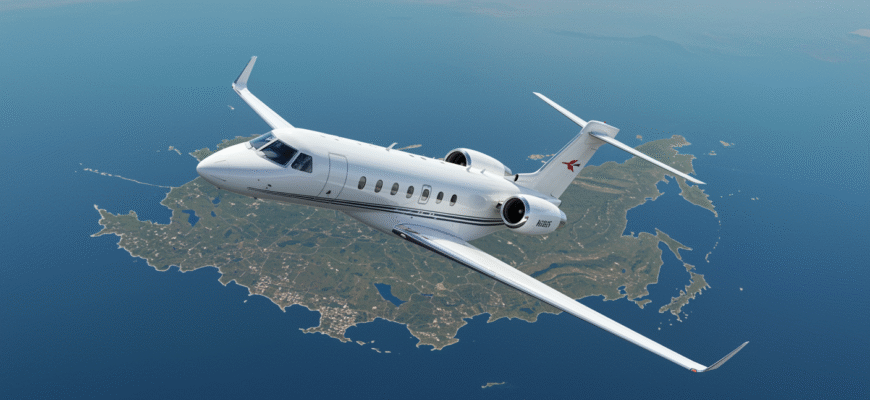A man holds his phone in Vienna, staring at a boarding pass that won’t scan. His daughter is dancing in Paris without him. A Russian businesswoman reroutes her third itinerary this month – through Dubai again – while counting the hours until her next investor meeting in Frankfurt. Chartering a private jet to or from Russia used to be a luxury. Now, it’s a logistical nightmare laced with emotion. Since early 2022, everything changed. Economic sanctions tightened, airspaces closed off, and global aviation regulators introduced new rules that turned familiar skies into uncertain territory. The rules didn’t just shift corporate plans – they split families, delayed surgeries, canceled weddings. Sanctions didn’t just land on paper; they landed on runways, grounding aircraft and expectations in the same breath. In this world, movement is no longer a matter of wealth alone – it’s about which passport you carry, which list you’re not on, and who’s willing to look the other way.
Why So Many Jets Can’t Fly In Or Out Of Russia Anymore
It’s not that people don’t want to fly private in or out of Russia — it’s that most can’t. The European Union Aviation Safety Agency (EASA) and the Federal Aviation Administration (FAA) issued bans that hit hard. These rules bar EU and U.S. operators from working with Russian clients or flying registry-tied aircraft into Russian territory. Even aircraft built with American components can trigger restrictions if used in violation of export laws.
On the business side, leasing giants like AerCap and SMBC quickly pulled out. That left dozens of aircraft stranded in a state of regulatory paralysis — unable to fly, sell, or even maintain without risking seizure. Registries tightened too. Any plane suspected of being operated under a flagged ownership structure got caught in a legal dead zone.
But not everyone slammed the door. Operators in “friendly” countries — mainly the UAE, Turkey, and Kazakhstan — picked up the pieces. Certain carriers restructured, changed their paperwork, and reopened charter options only for those who knew the right contacts. Some called it agility. Others called it running between the raindrops.
The New VIP Exodus: How The Ultra-Rich Still Fly
While the flight logs of corporate fleets froze, a new crop of operators emerged behind the scenes. Middlemen started arranging “clean” aircraft — jets not linked to sanctioned entities and scrubbed of problematic registrations. These charters quietly reroute through countries like Armenia or Azerbaijan, hopscotch to the Middle East, and eventually land somewhere in Europe without too many raised eyebrows.
A few key tactics now keep trips in motion:
- Jets are re-registered in neutral countries to wipe clean past affiliations.
- Legal entities are established to shield ownership from scrutiny, often through offshore nominees.
- Indirect route mapping avoids banned airspaces while adding hours to typical trips.
- Cryptocurrency and cash-based bookings reduce traceable paper trails.
One aircraft was recently tracked flying Moscow–Yerevan, stopping in Doha, then jumping to Milan. Not sketchy to an outsider, but those watching the flight paths closely note the patterns. An entire side market now lives in these movements — planes that shouldn’t be flying, still flying, just not how they used to. In the eyes of the ultra-wealthy, flying private hasn’t disappeared. It’s just gone deeper underground — quieter, riskier, and more fragmented.
Operators, Brokers, and Legal Gray Zones
Somewhere between Gulfstream cabins and frozen tarmacs in Lithuania, a new tribe of jet-set nomads has emerged. A surprising number of former Western flight operators have quietly resurfaced—this time in Dubai, Kazakhstan, and even Uzbekistan. Their names aren’t plastered across websites anymore. Their advertising? Nonexistent. These days, everything happens through word-of-mouth and encrypted messages.
They’ve gotten good at playing the paperwork game too. Passenger manifests are “private.” Itineraries are vague at best. One flight lands in Turkey—another takes off the next day to Russia with an entirely different tail number. Brokers arrange multi-stop journeys to mask origin or destination. It’s not foolproof, but it’s muddy enough to confuse enforcement agencies, especially when enforcement depends on who’s watching.
Some countries freeze private jets on arrival. In Poland, they’ve grounded jets tied to politically exposed persons. In Germany, others were simply turned away. Elsewhere? Silence. Airports in Central Asia seem more interested in business than geopolitics. That’s why operators set up shop where questions aren’t asked.
Brokers have learned not to boast. You won’t find flashy charter listings or Instagram reels tagged to Moscow. Everything’s unlisted. Quiet. Safe—for now. Those who know, know. The rest are locked out or left wondering where all the luxury went.
Families Stranded by Red Tape
This isn’t just about rich clients swirling champagne at 30,000 feet. It’s about fractured lives and the hurt of missing ordinary moments. Dual-citizens with Russian ties are finding themselves stuck—homes in Europe, roots in Moscow, and no legal way to make all the pieces fit.
A father can’t fly in for his daughter’s graduation without setting off alerts. A mother with a European passport risks sanctions if she visits her aging parents. Summer vacations get canceled. Some families book three-leg journeys with private segments that patch the impossible. But it’s not elegant. It’s desperate.
Travelers talk about the ache of missing births or not saying goodbye before a funeral. One woman, split between St. Petersburg and Vienna, whispered to a broker, “Can you get me home without hurting anyone?” That question carries more weight than any passport stamp ever could.
When Luxury Turns Desperate: The Psychological Cost
They built lives around freedom. Around speed. Around being able to leave when the walls closed in or fly home when something beautiful happened. Now, they’re grounded—not for lack of money, but because the air got political.
One businessman, once flying twice a week, says he hasn’t seen his elderly mother in a year. “It’s not the plane. It’s the way I built my life. I need to move to feel sane.” Another woman admitted crying after her charter was denied last minute: “I thought money could fix this. Turns out, no amount of upgrades gets you through a closed border.”
- Lifestyle rewired: For some, flight was synonymous with family. Being grounded breaks more than travel plans—it shatters rhythms and rituals.
- Isolation in plain sight: These are the people who look well-off but are stuck in holding patterns, emotionally and legally.
- Mobility isn’t just convenience— it’s love, it’s grief, it’s being there when “being there” matters most.
For all the talk about jets and sanctions, the truth is simpler and more painful: some people just want to go home. And for now, that door is locked in the sky.









